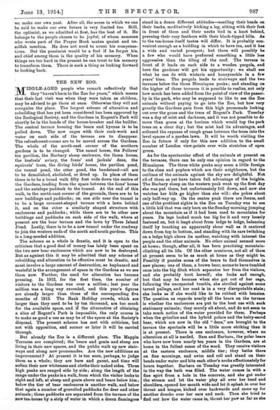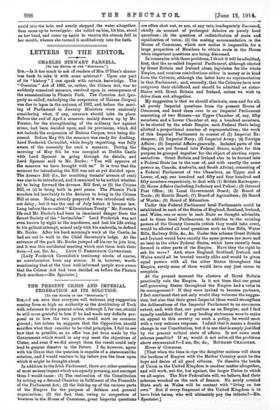THE NEW ZOO.
ATIDDLE.AGED people who remark reflectively that
they "haven't been to the Zoo for years," which means that their last visit was when they were taken as children, may be advised to go there at once. Otherwise they will not recognize the place. The largest scheme of alteration and rebuilding that has yet been considered has been approved by the Zoological Society, and the Gardens in Regent's Park will shortly be in the hands of the house-breaker and the builder. The central terrace housing the bears and hyenas is to be pulled down. The new cages with their rock-work and water on each side of the terrace are to disappear. The refreshment-rooms are to be moved across the Gardens. The whole of the north-east corner of the southern gardens is to be changed. The camel house, the Fellows' tea pavilion, the Barbary sheep enclosure, the llama house, the kestrels' aviary, the foxes' and jackals' dens, the squirrels' trees, the diving birds' house, the pavilion pond, the tunnel pond, the otter pond, the bandstand—all are to be demolished, abolished, or dried up. In place of them there is to be a broad walk fifty feet wide down the centre of the Gardens, leading from the space between the lions' house and the antelope paddock to the tunnel. At the end of this walk, in the north-east corner of the grounds, there are to be new buildings and paddocks; on one side near the tunnel is to be a large crescent-shaped terrace with a lawn behind it, and on the other a similarly shaped structure with enclosures and paddocks ; while there are to be other new buildings and paddocks on each side of the walk, where at present are the bear terrace and the lawn by Three Island Pond. Lastly, there is to be a new tunnel under the roadway to join the western ends of the north and south gardens. This is a long-needed addition.
The scheme as a whole is drastic, and it is open to the criticism that a good deal of money has lately been spent on the two new bear enclosures which are now to be destroyed. But as against this it may be admitted that any scheme of rebuilding and alteration to be effective must be drastic, and must involve a large amount of destruction, so haphazard and wasteful is the arrangement of space in the Gardena as we see them now. Further, the need for alteration has become pressing. In 1912, for the first time, the number of visitors to the Gardena was over a million; last year the million was a long way exceeded, and this year's figures are already larger than those of the corresponding five months of 1913. The Bank Holiday crowds, which are larger than they used to be by ten thousand, are too much for the available space, and if the alternative of obtaining a slice of Regent's Park is impossible, the only course is to make as good a use as may be of the space at the Society's disposal. The present scheme has met with criticism, but not with opposition, and sooner or later it will be carried through.
But already the Zoo is a different place. The Mappin Terraces are completed; the 'bears and goats and sheep are living in their new spaces, and the public walk up new stair- ways and along new promenades. Are the new additions an improvement ? At present it is too soon, perhaps, to judge theta as a whole; they are bare and gaunt, and time will soften their new whiteness and clothe their naked sides. Three high peaks are ranged aide by side; along the length of the range under the peaks is a walk, from which the visitor looks to right and left, at sheep and goats above and bears below him; below the tier of bear enclosures is another walk, and below that again a number of gravelled paddocks for deer and other animals; these paddocks are separated from the terrace of the pew tea-house by a strip of water in which a dozen flamingoes
stand in a dozen different attitudes—nestling their heads on their backs, meditatively kicking a leg, sitting with their feet in front of them and their necks tied in a knot behind, preening their rosy feathers with their black-tipped bills. As to the tea-house itself tastes will differ. It is probably con- venient enough as a building in which to have tea, and it has a wide and varied prospect; but there will possibly be a few who would have preferred something a little lees aggressive than the tiling of the roof. The terrace in front of it leads on each side to a wooden pergola, and here the gardener will get hie opportunity : we shall see what he can do with wistaria and honeysuckle in a few years' time. The pergola leads to stairways and the two terraces below the three Himalayan peaks; and standing on the higher of these terraces it is possible to realize, not only how much has been added from the point of view of the passer- by in the park, who may be supposed to like to see the Zoo animals without paying to go into the Zoo, but how very greatly the Gardens gain from this high promenade looking out over the grass and the trees of Regent's Park. Tuesday was a day of mist and darkness, and it was not possible to do more than guess at the horizon which would top the park trees on a clear day ; but the mist had its advantages, and softened the expanse of rough grass between the trees into the level spaces of a garden lawn. It will be worth visiting the Zoo in future if only for this new addition to the small number of London view-points over wide stretches of open green.
As for the spectacular effect of the animals at present on the terraces, there can be only one opinion in regard to the Himalayas. The three white peaks may seem a little foreign to the elms and poplars which are their neighbours, but the outlines of the animals against the sky are delightfuL Not all of them as yet have taken full advantage of the heights. The Barbary sheep on the western peak went up the first day she was put there, but unfortunately fell down, and now she watches her kids go higher than she will: she pokes about only half-way up. On the centre peak there are ibexes, and one of the prettiest sights in the Zoo on Tuesday was to see a little kid that was only born on the Sunday morning jumping about the mountain as if it had been used to mountains for years. Its legs looked much too big for it and very loosely fastened on, but it leapt about from ledge to ledge, balancing itself by touching an apparently sheer wall as it cantered down from top to bottom, and standing with its ears twitching on a ledge high above its mother, watching with interest the people and the other animals. No other animal seemed more at home; though, after all, it has been practising mountain. climbing all its life. Of the other creatures, not all of them at present seem to be as much at home as they might be. Possibly it puzzles some of the beam to find themselves in new places; one of them, a brown bear, seems to have tumbled once into the big ditch which separates her from the visitors, and she probably hurt herself; she looks sad enough, but that may be because when she got out of her cage, following the unexpected tumble, she strolled against some tarred palings, and her coat is in a very disreputable state; she looks as if she would like to be rubbed with benzine. The question as regards nearly all the bears on the terrace is whether the enclosures are put to the best use with such stationary animals; they merely sit about, and do not seem to take much notice of the water provided for them. Perhaps when the grizzlies and the hybrid polars and the hairy-eared bear, which are now in the old "dens," are brought to the terrace the spectacle will be a little more striking than it is at present. There is one enclosure, however, where no alteration at all is needed. Sam and Barbara, the polar bears who have now been nearly ten years in the Gardens, are at home in the fullest sense of the word. They receive 'visitors at the eastern enclosure, middle tier ; they bathe there on fine mornings, and swim and roll and stand on their heads under water and bite each other's necks affectionately for hours together. Barbara on Tuesday was greatly interested in the way the bath was filled. The water comes in with a fine spirt from a hole in the concrete, and she got under the stream and let the water play all over her head and shoulders, opened her mouth wide and let it splash in over her throat and tongue, kicked over backwards and came up for another douche over her ears and neck. Then she tried to find out how the water came in, thrust her paw as far as she could into the hole, and nearly stopped the water altogether. Sam came up to investigate; she rolled on him, bit him, stood on her head, and came up again to receive the stream full in her mouth, whence she turned it meditatively into the bath.











































 Previous page
Previous page